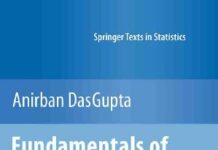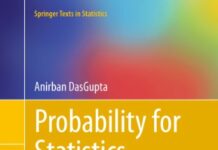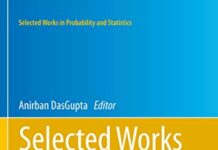
Ebook Info
- Published: 2008
- Number of pages: 749 pages
- Format: PDF
- File Size: 4.11 MB
- Authors: Anirban DasGupta
Description
This unique book delivers an encyclopedic treatment of classic as well as contemporary large sample theory, dealing with both statistical problems and probabilistic issues and tools. The book is unique in its detailed coverage of fundamental topics. It is written in an extremely lucid style, with an emphasis on the conceptual discussion of the importance of a problem and the impact and relevance of the theorems. There is no other book in large sample theory that matches this book in coverage, exercises and examples, bibliography, and lucid conceptual discussion of issues and theorems.
User’s Reviews
Editorial Reviews: Review From the reviews:”This is definitely not your typical book on theory. The approach that Dasgupta has taken with this far-reaching volume is to explore important results and applications of asymptotic theory without emphasizing the intricate mathematical details. The focus is on the forest rather than on the trees, and this results in a readable text that, for the most part, should be accessible to anyone with a first-year graduate-level course in statistical theory. I would imagine that this book woult be very useful as a first place to look for help in solving many problems in asymptotics. The book can provide an overview of the key issues, some ideas, and a path to more detail.” (Biometrics, September 2008)”Presents an encyclopedic treatment of classic as well as contemporary large sample theory, including both statistical problems and probabilistic issues and tools.” (Journal of Economic Literature, Volume 46, no. 3, 2008)”… a nice handbook and reference material. This is a different book on the asymptotic theory and its use in probability and statistical inference. It covers a wide range of divergent topics where the large sample theory is useful and can be naturally applied. … The book is will organized and clearly written. The book works well as a reference text for a theoretical statistician working with the asymptotics. It can also be used as a textbook for several topics of the graduate courses.” (International Statistical Review,2009, 77, 1)”This book provides a comprehensive overview of asymptotic theory in probability and mathematical statistics. … The text is written in a very clear style … . the book is a very good choice as a first reading. It also contains a large collection of inequalities from linear algebra, probability and analysis that are of importance in mathematical statistics. This collection makes the volume even more valuable as a reference for students as well as research workers.” (Zentralblatt MATH, Vol. 1154, 2009)”This amazing book covers an enormous variety of topics from modern statistics and probability…Among the great achievements of the author is not only the panoramic coverage of modern stochastics but also in demonstrating convincingly the fundamental role of probability theory in any kind of statistical inference problems…An unreplaceable source of information for anyone studying probability and statistics…An invaluable reference to be acquired by any good science library.” (Journal of the Royal Statistical Society)“Contains a total of 35 (!) chapters, covering both theoretical foundations and many … applications of asymptotic statistics. The chapters can broadly be classified in two categories: more classic large sample theory chapters, and chapters containing topics which are usually not treated in other books on asymptotics. … I would recommend this book to readers who have attended courses on probability theory … and mathematical statistics. … Someone who searches a good and exhaustive reference book for asymptotic statistics … will certainly appreciate this book.” (Björn Bornkamp, Statistical Papers, Vol. 51, 2010)“This book provides a very broad coverage of both classical and contemporary topics, with an emphasis on the conceptual discussion of results, issues, tools and implications. … This makes the book quite different from other books on asymptotics and provides an invaluable reference for anyone studying probability and statistics. It can be used to design graduate-level courses with various emphases, to assign for independent reading, and to have a comprehensive overview of asymptotic theory.” (Wenbo V. Li, Mathematical Reviews, Issue 2011 m) From the Back Cover This book is an encyclopedic treatment of classic as well as contemporary large sample theory, dealing with both statistical problems and probabilistic issues and tools. It is written in an extremely lucid style, with an emphasis on the conceptual discussion of the importance of a problem and the impact and relevance of the theorems. The book has 34 chapters over a wide range of topics, nearly 600 exercises for practice and instruction, and another 300 worked out examples. It also includes a large compendium of 300 useful inequalities on probability, linear algebra, and analysis that are collected together from numerous sources, as an invaluable reference for researchers in statistics, probability, and mathematics.It can be used as a graduate text, as a versatile research reference, as a source for independent reading on a wide assembly of topics, and as a window to learning the latest developments in contemporary topics. The book is unique in its detailed coverage of fundamental topics such as central limit theorems in numerous setups, likelihood based methods, goodness of fit, higher order asymptotics, as well as of the most modern topics such as the bootstrap, dependent data, Bayesian asymptotics, nonparametric density estimation, mixture models, and multiple testing and false discovery. It provides extensive bibliographic references on all topics that include very recent publications.Anirban DasGupta is Professor of Statistics at Purdue University. He has also taught at the Wharton School of the University of Pennsylvania, at Cornell University, and at the University of California at San Diego. He has been on the editorial board of the Annals of Statistics since 1998 and has also served on the editorial boards of the Journal of the American Statistical Association, International Statistical Review, and the Journal of Statistical Planning and Inference. He has edited two monographs in the lecture notes monograph series of the Institute of Mathematical Statistics, is a Fellow of the Institute of Mathematical Statistics and has 70 refereed publications on theoretical statistics and probability in major journals.
Reviews from Amazon users which were colected at the time this book was published on the website:
⭐Professor DasGupta is a student of Peter Hall. Hall is one of the most brilliant probabilists/statisticians that I have ever met. He is famous for his work on martingales, the bootstrap and Edgeworth expansions to mention a few important topics. Hall has also published excellent theoretical books on the bootstrap and on martingales (the latter withC. C. Heyde). In reading this book I can see that Professor DasGupta has learned well from the master. As the author points out there are several good books on probability theory including the texts by Chung, Durrett, and Billingsley. Also the asymptotic theory of statistics is well-covered by Lehmann, LeCam and Ferguson. In the preface the author cites these and many other fine references. He also has an extensive bibliography and points the reader to the texts that provide proofs of the theorems when the proofs are not given in this text. The text is thorough and I tend to agree with the author and the publisher that the book is unique and encyclopediac in nature. Certainly all the probability and most of the statistics that I learned in graduate school is contained within these pages (over 700 counting the indices). If the author provided proofs of every theorem in the book it would probably balloon to over 1000 pages.There are also a wealth of exercises and examples throughout the text. It seems to me that this book would be suitable for a two semester (three quarter sequence) for graduate students in statistics. It is also the perfect reference book for the serious research statistician. It even contains a whole chapter on probability inequalities.There are many topics that you don’t normally see in a text on this general topic. That would include the section on the Delta theorem, the chapter on sample extremes, large deviation results, the bootstrap, the jackknife and Stein’s method.I did my dissertation on extreme value theory for stationary processes and published a book on the bootstrap. So my only disappointment was that none of my work was directly referenced, although it is covered in some of the texts that DasGupta references. So although he has done a masterful job of covering asymptotic theory very broadly and he has provided references for additional information there are a few important references that were missed. In addition to my text I think the fine book by Brian Manly on the bootstrap and permutation methods should have been referenced.
⭐I like this book very much. It contains an unusual quantity of useful material and useful pointers to other sources. It brought a smile to my face on more than one occasion. Prof. DasGupta must be an excellent teacher because the style of writing and presentation is really quite friendly/inviting. I found several really nice theorems and inequalities in here. I saw some things that I use regularly that I have never actually seen in a book before. I have recently taken it off the shelf repeatedly to get useful results for a research project. This is not light reading, but neither is it some dense incomprehensible book. I find myself using this book more and more often the longer I have it on my shelf.Did Prof. DasGupta choose the purple cover? It makes it easy to find on the shelf.
⭐This is a great book, but it would be a lot more useful if it contained proofs of some of the theorems. But it’s excellent because the writing is clear, the notation is clear, and a lot of topics are covered and theorems presented. It’s just be nice to have some proofs, but whatever – I’m just a lowly grad student.
Keywords
Free Download Asymptotic Theory of Statistics and Probability (Springer Texts in Statistics) 2008th Edition in PDF format
Asymptotic Theory of Statistics and Probability (Springer Texts in Statistics) 2008th Edition PDF Free Download
Download Asymptotic Theory of Statistics and Probability (Springer Texts in Statistics) 2008th Edition 2008 PDF Free
Asymptotic Theory of Statistics and Probability (Springer Texts in Statistics) 2008th Edition 2008 PDF Free Download
Download Asymptotic Theory of Statistics and Probability (Springer Texts in Statistics) 2008th Edition PDF
Free Download Ebook Asymptotic Theory of Statistics and Probability (Springer Texts in Statistics) 2008th Edition


